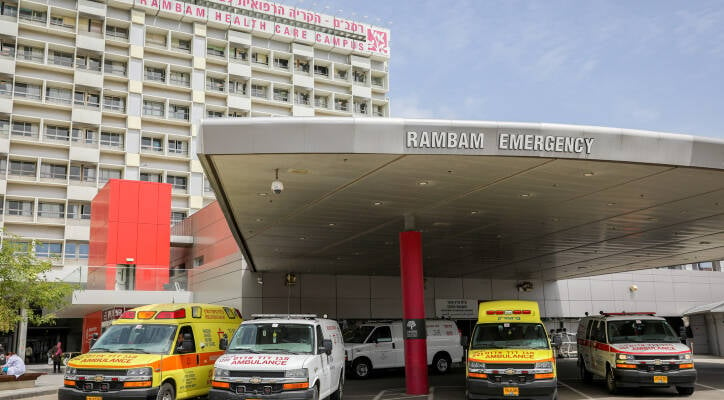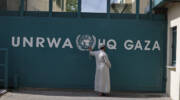To prepare for mass casualty events, the hospital conducts regular emergency drills and simulations, refined over the years to address scenarios from missile attacks to large-scale evacuations.
By Sveta Listratov, TPS
As Israel-Hezbollah tensions rise, hospitals in the Galilee and beyond are bracing for expanded war and casualties, with fortified areas, AI, and studies from previous wars providing security and guidance.
“The emergency is in our DNA. From our underground facilities to advanced AI systems, we are equipped to handle the worst,” Dr. Tsvi Sheleg, deputy director general of Galilee Medical Center in Nahariya, told The Press Service of Israel.
Located just nine kilometers from the Lebanon border, the hospital is Israel’s closest medical center to any border.
The hospital was the first one in the country to develop extensive underground facilities to ensure uninterrupted medical care during attacks. These include 450 protected monitoring places connected by tunnels, allowing safe movement and treatment.
The hospital’s emergency room and other critical sites are shielded, enabling staff to continue working even during missile strikes.
“No one thought that we should build underground hospitalization facilities,” Sheleg explained. “But [former director-general Shaul] Shasha said, ‘I will build it.’ During the Second Lebanon War in 2006, because of this, my life and the lives of 15 other people were saved, as the direct missile that struck the department would have endangered our lives.”
In addition, the hospital uses advanced technology to streamline operations and improve efficiency. The Viz.AI system leverages artificial intelligence to analyze CT scans, expediting critical medical decisions and reducing response times.
Similarly, the Admission, Discharge, and Outpatient Care system quickly identifies clinical situations in CT scans, enhancing accuracy in medical responses.
“These technologies not only save lives but also ensure that we can operate under the most challenging conditions,” Sheleg said.
To prepare for mass casualty events, the hospital conducts regular emergency drills and simulations, refined over the years to address scenarios from missile attacks to large-scale evacuations.
Collaborations with tech companies have resulted in specialized modules for trauma management and other critical areas, enhancing their emergency response capabilities.
“The fact that we have been taking shelter in protected spaces since October 7th has allowed us to prepare in the best possible way. It is different when you truly live through the reality. Many new lessons are learned,” Sheleg stressed.
Insights and Innovations
In Haifa, the Rambam Health Care Campus is drawing from past experiences and research from the Second Lebanon War of 2006 to enhance its readiness and patient care strategies.
“We have gained valuable insights from the Second Lebanon War. Our research has played a crucial role, offered guidance and refined essential aspects in our approach to support mothers and reinforce our team to provide resilient care,” Michal Kranzler, the head nurse of the maternity and gynecological division, told TPS-IL.
The hospital manages nearly 400 births monthly. During wartime, it is prepared to double this number, as mothers from northern towns are expected to be transferred to the Haifa area.
Kranzler noted that while the facility has not yet moved to its protected areas, it can do so within hours. This capability makes it a preferred choice for many expectant mothers from both the north and Gaza-border communities seeking a secure birth environment.
A study of Rambam’s maternity care during the 2006 war revealed heightened stress levels among mothers during attacks, underscoring the crucial role of midwives in providing support.
In response, the hospital initiated proactive measures, including a hotline and Zoom meetings for maternal inquiries, an Emotional Response Clinic for psychological support, and specialized courses in multiple languages.
Social media informed evacuated communities of available assistance, and even staff are cared for with alternative medicine options such as meditation, massage and music therapy.
“Today we are very skilled and prepared for activity under extreme circumstances. The protected hospital, equipped with infrastructure, was ready and prepared as soon as the war began, capable of including close to two thousand beds,” Kranzler told TPS-IL.
“Although quite a few doctors, staff members, and nursing staff were drafted into the reserves, we find solutions. Everyone pitches in. It’s in the team’s DNA, to mobilize for our mission.”
Said Sheleg, “I firmly believe there’s no substitute for experience. In moments of crisis, what’s essential are individuals with mental fortitude—those who harness their skills, motivation, leadership, and resilience to navigate profound uncertainty. The more one encounters such challenges, the greater and more impactful their contribution becomes.”
Around 60,000 Israelis living in northern communities were forced to evacuate in October when the Hezbollah terror organization began daily rocket and drone attacks.
Leaders of the Iran-backed terror group have said they will continue the attacks to prevent Israelis from returning to their homes. Since October 7, the Hezbollah attacks have killed 10 civilians and 14 soldiers.
Israeli officials have been calling for Hezbollah to be disarmed and removed from Southern Lebanon in accordance with UN Security Council resolution 1701, which ended the 2006 Second Lebanon War.
Do You Love Israel? Make a Donation - Show Your Support!
Donate to vital charities that help protect Israeli citizens and inspire millions around the world to support Israel too!
Now more than ever, Israel needs your help to fight and win the war -- including on the battlefield of public opinion.
Antisemitism, anti-Israel bias and boycotts are out of control. Israel's enemies are inciting terror and violence against innocent Israelis and Jews around the world. Help us fight back!























